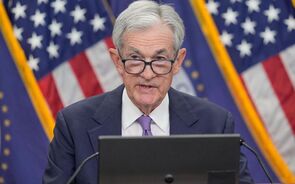Greenspan Calls Energy Prices Key to Economy's Path
1 Mensagem
|Página 1 de 1
Greenspan Calls Energy Prices Key to Economy's Path
May 20 (Bloomberg) -- Businesses and consumers are already changing investment and purchasing plans to adapt to higher energy prices, eventually reducing the energy intensity of the U.S. economy, Federal Reserve Chairman Alan Greenspan said.
``With energy prices again on the rise, more rapid decreases in the intensity of use in the years ahead seem virtually inevitable,'' Greenspan said in the text of his remarks to the New York Economic Club. The rise in oil prices over the past two years ``has been substantial enough and persistent enough to direct business investment decisions in favor of energy cost reduction.''
Rising energy costs contributed to faster inflation and the slowest economic growth in two years last quarter, when the U.S. economy expanded 3.1 percent at an annual rate. Consumer prices rose at a 4.8 percent annual rate from January through April, compared with a 4.4 percent rate at the same time last year.
The Fed is raising its target interest rate in part to keep faster inflation from energy prices from spreading throughout the economy. Minus food and energy, prices rose at a 2.6 percent annual rate in this year's first four months, matching the same period last year.
Futures contracts on the federal funds rate show traders fully expect the Fed to raise the overnight lending rate another 0.25 percentage points in June to 3.25 percent, the ninth increase in a row. Futures markets show a more than 80 percent chance for another quarter-point boost on Aug. 9.
Greenspan didn't speak about the economic outlook or the direction of interest rates in the text of his prepared remarks. He and other members of the Fed's Open Market Committee next meet June 30.
`Price Frenzy'
Greenspan last spoke extensively on energy April 5 and predicted that rising inventories would damp the ``price frenzy'' in the crude oil market. He was right: Benchmark crude oil prices in New York have dropped about 18 percent since then as supplies in the U.S., the world's biggest oil consumer, have risen about 14.5 percent this year to the highest since June 1999.
Today, he predicted inventory accumulation would continue.
``Inventory accumulation is likely to continue unless demand rises, output declines, or we run out of storage capacity,'' the chairman said.
The U.S. needed 53 percent less oil to produce $1 billion dollars of economic output in 2004 than in 1973, a Bloomberg News calculation using Energy and Commerce Department data showed. Greenspan predicted today that this decline in intensity would continue.
``Energy use over time will continue to decline relative to gross domestic product,'' he said.
Geopolitical Issues
The Fed chairman outlined several events that could alter oil prices in the future. ``The resolution of current major geopolitical uncertainties will materially affect oil prices in the years ahead,'' he said.
Producing countries will have to make larger investments in their oil industries or more investments will have to be made in countries where it is now risky or restricted. Technology will continue to improve oil recovery rates, he said.
So far, ``investment to convert reserves to productivity capacity has fallen short of the levels required to match unexpected recent gains in demand, especially gains in China,'' he said.
U.S. natural gas prices have been as much as $4 per million British thermal units higher than those abroad, hurting fertilizer and other industries, in part because of a lack of transport and import terminals, Greenspan said. That's changing as import terminals now opening in Maryland and Georgia, he said.
Natural Gas Prices
``Unless world gas markets tighten aggressively, competitive pressures will arbitrage the U.S. natural gas price down, possibly significantly, through increased imports,'' Greenspan said.
The signal of higher prices is likely to spur more investment, and greater use of alternatives to oil, such as liquid natural gas. ``If history is any guide, oil will eventually be overtaken by less-costly alternatives well before conventional oil reserves run out,'' Greenspan said.
The transition, however, will take time, Greenspan said. ``We, and the rest of the world, doubtless will have to live with geopolitical and other uncertainties of the oil markets for some time to come,'' Greenspan said. ``Developments in energy markets will remain central in determining the longer run health of our nation's economy.''
``With energy prices again on the rise, more rapid decreases in the intensity of use in the years ahead seem virtually inevitable,'' Greenspan said in the text of his remarks to the New York Economic Club. The rise in oil prices over the past two years ``has been substantial enough and persistent enough to direct business investment decisions in favor of energy cost reduction.''
Rising energy costs contributed to faster inflation and the slowest economic growth in two years last quarter, when the U.S. economy expanded 3.1 percent at an annual rate. Consumer prices rose at a 4.8 percent annual rate from January through April, compared with a 4.4 percent rate at the same time last year.
The Fed is raising its target interest rate in part to keep faster inflation from energy prices from spreading throughout the economy. Minus food and energy, prices rose at a 2.6 percent annual rate in this year's first four months, matching the same period last year.
Futures contracts on the federal funds rate show traders fully expect the Fed to raise the overnight lending rate another 0.25 percentage points in June to 3.25 percent, the ninth increase in a row. Futures markets show a more than 80 percent chance for another quarter-point boost on Aug. 9.
Greenspan didn't speak about the economic outlook or the direction of interest rates in the text of his prepared remarks. He and other members of the Fed's Open Market Committee next meet June 30.
`Price Frenzy'
Greenspan last spoke extensively on energy April 5 and predicted that rising inventories would damp the ``price frenzy'' in the crude oil market. He was right: Benchmark crude oil prices in New York have dropped about 18 percent since then as supplies in the U.S., the world's biggest oil consumer, have risen about 14.5 percent this year to the highest since June 1999.
Today, he predicted inventory accumulation would continue.
``Inventory accumulation is likely to continue unless demand rises, output declines, or we run out of storage capacity,'' the chairman said.
The U.S. needed 53 percent less oil to produce $1 billion dollars of economic output in 2004 than in 1973, a Bloomberg News calculation using Energy and Commerce Department data showed. Greenspan predicted today that this decline in intensity would continue.
``Energy use over time will continue to decline relative to gross domestic product,'' he said.
Geopolitical Issues
The Fed chairman outlined several events that could alter oil prices in the future. ``The resolution of current major geopolitical uncertainties will materially affect oil prices in the years ahead,'' he said.
Producing countries will have to make larger investments in their oil industries or more investments will have to be made in countries where it is now risky or restricted. Technology will continue to improve oil recovery rates, he said.
So far, ``investment to convert reserves to productivity capacity has fallen short of the levels required to match unexpected recent gains in demand, especially gains in China,'' he said.
U.S. natural gas prices have been as much as $4 per million British thermal units higher than those abroad, hurting fertilizer and other industries, in part because of a lack of transport and import terminals, Greenspan said. That's changing as import terminals now opening in Maryland and Georgia, he said.
Natural Gas Prices
``Unless world gas markets tighten aggressively, competitive pressures will arbitrage the U.S. natural gas price down, possibly significantly, through increased imports,'' Greenspan said.
The signal of higher prices is likely to spur more investment, and greater use of alternatives to oil, such as liquid natural gas. ``If history is any guide, oil will eventually be overtaken by less-costly alternatives well before conventional oil reserves run out,'' Greenspan said.
The transition, however, will take time, Greenspan said. ``We, and the rest of the world, doubtless will have to live with geopolitical and other uncertainties of the oil markets for some time to come,'' Greenspan said. ``Developments in energy markets will remain central in determining the longer run health of our nation's economy.''
- Mensagens: 555
- Registado: 2/7/2004 18:11
1 Mensagem
|Página 1 de 1


